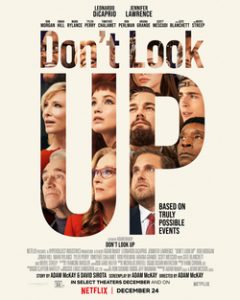8 Comedies
Parasite possibly could have been included in this chapter on Cli-Fi Films that – rather incongruously, given the seriousness of the subject matter – harness comedy to communicate their themes around climate change. And certainly other films in this resource include humor, often to provide levity in the midst of extremely serious themes. But the three films highlighted here are rare in the extent to which they view climate change through a comedic lens.
An early entry in this category is a rare (for a Cli-Fi Film) romantic comedy, The American President (1996). However, as was common for the earlier Cli-Fi Films, climate change was fairly tangential to the main story line. President Andrew Shepherd (Michael Douglas) pursues Washington newcomer Sydney Ellen Wade (Annette Bening), an environmental lobbyist whose firm is working to pass legislation to substantially reduce carbon dioxide emissions. Romantic and political hijinks ensue as Shepherd jockeys to assist Wade’s agenda while at the same time attempting to win the passage of a crime control bill and winning Wade’s heart. Although some in Shepherd’s party view Wade – who has a past as an environmental activist – as a political liability, romance prevails:
The film may be best known as the inspiration for screenwriter Aaron Sorkin’s later, wildly popular and critically acclaimed television drama The West Wing. But it also presents Sorkin’s vision, via the legislation that Sydney Wade promotes, of a U.S. that could cut climate pollution by one-fifth by 2005. Bening’s character tells the president’s chief of staff: “It’s the burning of fossil fuels that’s been mostly responsible for global warming, and the 20% reduction … is a necessary first step toward arresting the catastrophic greenhouse effect.” Unfortunately, this turned out to be way too optimistic.
Over twenty years later, the hyper realistic style of The American President was supplanted by new technologies in film in Downsizing (2017), starring Matt Damon as Paul Safrânek, who undergoes a procedure to shrink his body so he can start a new life in an experimental community, Leisureland. Ten years before, in order to address overpopulation and global warming, a Norwegian scientist develops “downsizing,” an irreversible process that shrinks organic material, reducing people to a height of approximately five inches. While intended to drastically decrease consumption and waste, the first subjects in the experiment discover that an added benefit is that their money goes a lot further when living this downsized existence, and it becomes a global sensation (and don’t miss the appearance of a certain actor from the popular series Ted Lasso – remember the poster in my media room?):
When Paul’s wife Audrey (Kristin Wiig, seen above) backs out of joining him in downsizing, he finds himself alone until befriending an impoverished Vietnam activist named Ngoc Lan Tran (Hong Chau), who was shrunk by her government against her will. Through this friendship, Paul discovers that the societal inequities that exist in the “large world” have been duplicated in Leisureland, where service workers like Ngoc Lan live in slums. And in the end, it is discovered that it is too late for downsizing to save the world.
Neither a critical nor box office success, Downsizing nonetheless presents a unique possible solution to human-caused climate change, even as it proved ineffective. But films like it contribute to the larger creative, outside-the-box thinking that may eventually lead to more viable solutions.
It is fitting that as we wrap up our exploration of Cli-Fi Films, we return to the first movie mentioned in the introduction to this text. It also happens to be the first explored here that was created for streaming – specifically Netflix. Don’t Look Up is a black comedy “[b]ased on real events that haven’t happened – yet” about two astronomers, Kate Dibiasky (Jennifer Lawrence) and Dr. Randall Mindy (Leonardo DiCaprio) attempting to warn humanity of an approaching comet that will destroy the planet. Their warnings fall on deaf ears, from frivolous treatment by the media (see clip below), to denial by NASA’s director, to exploitation for political and financial gain by President Orlean (Meryl Streep) and her staff (including her son/Chief of Staff, Jason, played by Jonah Hill). The film is a damning condemnation of today’s real-world American “idiocracy.”

to belong to the distributor of the film, Netflix, the publisher
of the film or the graphic artist. Used under fair use.
Source: https://en.wikipedia.org/wiki/Don%27t_Look_Up
The film actually is an allegory for climate change, according to director Adam McKay: “This movie came from my burgeoning terror about the climate crisis and the fact that we live in a society that tends to place it as the fourth or fifth news story, or in some cases even deny that it’s happening, and how horrifying that is, but at the same time preposterously funny.”[1] Bong Joon-ho, director of Snowpiercer and Parasite, called Don’t Look Up one of his favorite films of 2021, but reviews were mixed. The San Francisco Chronicle‘s critic praised the film, writing, “Don’t Look Up might be the funniest movie of 2021. It’s the most depressing too, and that odd combination makes for a one-of-a-kind experience… McKay gives you over two hours of laughs while convincing you that the world is coming to an end.”[2] Others weren’t so impressed; David Rooney of The Hollywood Reporter called the film “[a] cynical, insufferably smug satire stuffed to the gills with stars that purports to comment on political and media inattention to the climate crisis but really just trivializes it.”[3] But the week of its release on Dec. 24, 2021, Don’t Look Up was the most-streamed English-language film on Netflix, so trivialized or not, its perspective on the climate crisis was garnering audience attention.[4]
Scientists also paid attention, with numerous climatologists and climate advocates waxing positive. One remarked, “Don’t Look Up is satire. But speaking as a climate scientist doing everything I can to wake people up and avoid planetary destruction, it’s also the most accurate film about society’s terrifying non-response to climate breakdown I’ve seen.”[5] Laura Hiscott in physicsworld stated that “the film brings a beautiful bluntness to the topic in a way that I haven’t seen before in fiction” and praised it for capturing the complexities of climate change.[6] And climate policy expert Ayana Elizabeth Johnson and McKay co-wrote an op-ed in The Guardian advocating for the value of humor in promoting action on climate change, stating: “We can’t just sit back and watch what’s happening to the planet. We are not an audience. Like it or not, we are in this story.”
After sharing sobering statistics on the lack of media coverage on what they term the “climate catastrophe,” McKay and Johnson argue:
Clearly we need to reassess how we’re communicating this massive story. So, Don’t Look Up tries to do something that perhaps doesn’t feel natural with a story as dark as climate change: make the audience laugh. Because when people laugh together it gives them perspective, relief and, most of all, a semblance of community. This is not conjecture. Research shows that humor can lower our defenses and make hard truths easier to hear.
Hopefully comedy can help elucidate how our culture of swipes, clicks and likes is taking us further and further away from the one subject we must talk about.
The director and climate expert policy expert end the piece some advice that is worth including here in its entirety (quoting under fair use for educational purposes):
Maybe some film or gif or TikTok has jostled you to think seriously about what you can do. Specifically you. Well, here’s one way to answer that question: think of a Venn diagram with three overlapping circles. In the first, put what you’re good at. (So, which Avenger are you and what are your specific super powers?) In the second, put what part of the climate challenge you want to work on. (Your mission, should you choose to accept it.) In the third, put what brings you joy. (What, for you, isn’t work because you love it so much?) And then find your way to the epicenter of that climate action Venn diagram for as many minutes of your life as you can. We don’t all have to do the same thing – in fact we shouldn’t. And if you want some help getting started, we’ve got you covered with some specific suggestions for steps you can take toward a safer planet.
You see, when it comes to climate change, we are all in the writers’ room right now, deciding how the story unfolds and how it ends. And that story can be funny, dire, hopeful or all of the above. But not every story is guaranteed a happy ending, even though that’s mostly what we see in movies. So we can’t just sit back and watch. We are not an audience. Like it or not, we are in this story.[7]
I couldn’t have put it better. So I will end this chapter here and save a few words of my own for the conclusion, a consideration of what’s next for Cli-Film Films.

KNOWLEDGE CHECK
Videos
- “Don't Look Up' Cast Breaks Down Their New Netflix Comedy,” Around the Table, Entertainment Weekly. (December 16, 2021). Archived on YouTube from the original on January 13, 2022. Retrieved March 31, 2023. ↵
- LaSalle, Mick (December 7, 2021). "Review: Leonardo DiCaprio and Jennifer Lawrence star in very funny, very depressing 'Don't Look Up.'"San Francisco Chronicle. Archived from the original on December 10, 2021. Retrieved March 31, 2023. ↵
- Rooney, David (December 7, 2021). "Leonardo DiCaprio and Jennifer Lawrence in Adam McKay's 'Don't Look Up': Film Review." The Hollywood Reporter. Archived from the original on December 9, 2021. Retrieved March 31, 2023. ↵
- Don't Look Up. Wikipedia. Retrieved April 2, 2023. ↵
- Kalmus, Peter (December 29, 2021). "I'm a climate scientist. Don't Look Up captures the madness I see every day." The Guardian. London, United Kingdom. Archived from the original on December 29, 2021. Retrieved April 2, 2023. ↵
- Hiscott, Laura (January 17, 2022). "Laughing in the face of danger: how Netflix's Don't Look Up captures climate complexity." physicsworld. January 17, 2022. Archived from the original on February 5, 2022. Retrieved April 2, 2023. ↵
- MacKay, Adam, and Johnson, Ayana Elizabeth (January 13, 2022). "Why our secret weapon against the climate crisis could be humour.” The Guardian. Archived from the original on February 14, 2022. Retrieved April 3, 2022. ↵
